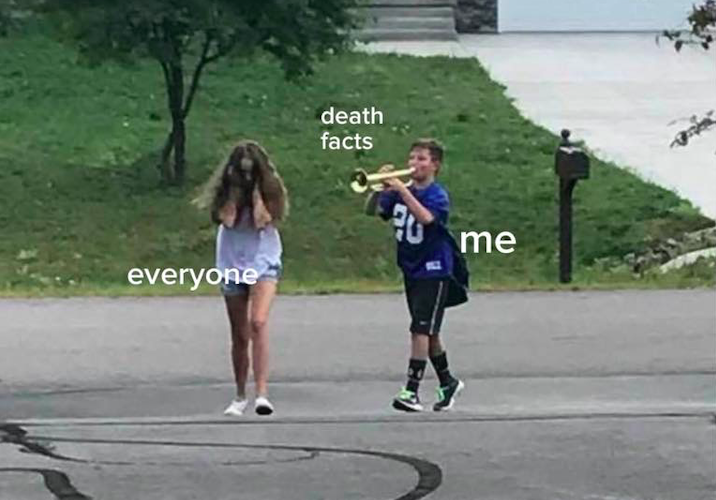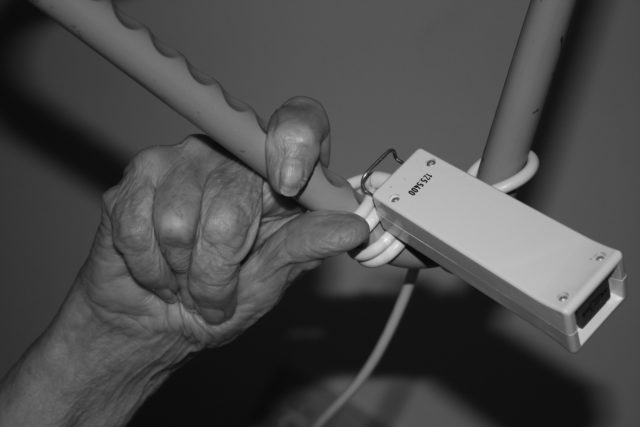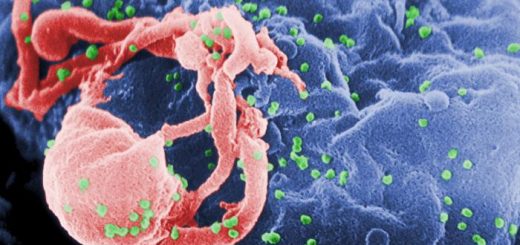Modern medicine and successful dying

Katrina attended the Glasgow Science Festival event ‘Modern Medicine and Death – an Unhealthy Relationship?’ The answer to that question was a resounding “yes” (from both panellists and audience), but we can’t lay the blame solely on our doctors. In the words of Lana Del Rey, “you and I, we were born to die” – so why does our society struggle so hard against the inevitability of death? We can all take some basic steps to prepare ourselves for what’s coming.
I don’t mind talking about death – I’ve been a morbid person for as long as I can remember. I’m not sure how my interest in the macabre began, but I suspect it’s linked to my mum’s interest in watching reruns of Forensic Files. I was drawn to the event ‘Modern Medicine and Death – an Unhealthy Relationship?’ at Glasgow Science Festival, partly through morbid curiosity. But I also realised I’d never heard doctors talk frankly about dying (at least not like I do with my friends, colleagues, and anyone else that will listen).
The panel was chaired by Dr Richard Smith, a member of the Lancet Commission on the Value of Death. The inspiration behind this commission was fellow panellist Dr Seamus O’Mahony’s ‘The Way We Die Now’, a book revealing how we, as a society, have lost our ability to deal with death. Richard and Seamus were joined by Dr Libby Sallnow, a palliative care consultant, PhD student, and social activist in the Compassionate Communities movement, and Prof Robin Taylor, a consultant and author of ‘Coping with Crisis: Navigating the Challenges of Medical Decision-Making’. They discussed the odd language we all use when talking about death and how our perspective on mortality is influencing the way that we die. While our death-denying culture is partially to blame, maybe our doctors have messed up dying.
The problem with dying
People have an attitude problem when it comes to facing death, be it our own or that of someone close to us. We avoid talking about it – we use euphemisms like ‘not going to make it’ and ‘passing on’. We avoid looking at it – we pull sheets over heads and draw hospital curtains. Maybe we’re just trying to protect ourselves and those around us. Libby suggests that, while we may think we’re preventing additional pain, we’re revealing our reluctance to face the finality of death. So why does this matter? The thing is, our mortality isn’t a problem to be fixed. It’s an inevitable and intrinsic part of life. Denial can be a helpful short-term coping mechanism when facing a loss, but this usually makes way for acceptance. A complete and total avoidance of death can hamper the grieving process and affect long-term recovery3.
We better get used to death because more of us are dying. Mortality in the UK is rising: the average life expectancy of those born in 2019 will be shorter than those born in 2015. Compared with 19 other countries (mainly European countries, but also Japan and the US), the UK is the only one to see a drop in life expectancy for both men and women. And this rise isn’t linked to our ageing population – mortality has risen for all age groups, including newborns4 5. When we die is concerning, but how we die is also becoming a public health issue. How people die is actually a good indicator of a country’s quality of care6).
How would you like to die?
The panel discussion began with some audience participation: Richard asked, “How would you like to die?”. Voting for our preferred method of death (or ‘exit strategy’) sounds weird now I’m writing it down, but it was an interesting icebreaker. Apparently, there are just four ways to die from natural causes:
- You could die suddenly. From a heart attack, for example.
- You can die slowly in old age (usually from dementia or frailty).
- You can die from cancer.
- Or, you can die from organ failure.
Almost all audience members raised their hands for option 1. It turns out that those people, myself included, are maybe a bit selfish when it comes to dying. I hadn’t considered the impact that a sudden death can have on the people around you (probably because I’ve never had anyone close to me drop dead, and because it’s unlikely to happen to someone my age). There were a couple of hands raised for dying from dementia, and I was surprised to see more than a dozen hands raised for cancer – the ‘emperor of all maladies’.
Richard has previously written in the BMJ that cancer is “the best way to die”7 (although I think people with cancer would probably disagree). It had never occurred to me that this could be an attractive option. But I can see where Richard is coming from; people diagnosed with terminal cancer have time to ‘get their affairs in order’. Having the chance to say goodbyes can be psychologically beneficial, both for the patient and their family (your inevitable death can be less traumatic for those close to you if they are informed in advance8).
Taking control of your end of life arrangements, like funeral planning and leaving a will, can be comforting in a way – you can rest knowing this won’t be a burden on your relatives. However, advanced warning is given to patients with a whole variety of terminal illnesses, not just ‘the big C’. In fact, there are many cases where doctors are unable to tell if a patient will die within months, or even years. This can be an incredible strain. With improved palliative chemotherapy, it now takes people longer to die, and that, in Richard’s words, can be miserable.
The only other potential benefit I see is that some people with terminal cancer are eligible for hospice care. Funded largely by charities, hospices can provide “deluxe dying” with dedicated palliative care teams (although some don’t like the idea and would prefer to die at home). With more of us getting cancer than ever before, hospice beds are getting more scarce. Most NHS patients don’t have this option, especially if they’re dying from a terminal illness less socially acceptable, like liver failure (Robin points out that you rarely hear of patients losing their heroic battle with alcoholism).
What makes a ‘good death’?
Many have written about what makes a ‘good death’ 9 10 11). This sanitised version of death is becoming a national obsession. A recent review on ‘successful dying’ identified 11 core themes that appear across studies where people (usually terminally ill patients or their relatives) list what is important to them at the end of life12. Seamus thinks aiming for a good death is counterproductive – it can become a box-ticking exercise. It’s also a burden on healthcare professionals who have to ensure that terminally ill patients receive the good death they’re expecting. Plus, fulfilling all 11 themes would require the kind of resources that our stretched health service could only dream of.
The themes identified include what I consider to be the basics, like having family present and dying with dignity. But things get pretty unrealistic, pretty quickly. ‘A sense of emotional wellbeing’ is something I barely manage day-to-day; I imagine most people hoping to accomplish this on their deathbed will be disappointed. People also want to have a sense of ‘life completion’; a mindset difficult to achieve for anyone not dying from old age. One of the core themes is having a good relationship with healthcare professionals, but if, like most people dying in the UK, you’ve been admitted to hospital, you’re more likely to see an assortment of strangers than your GP. At least in hospital, you have a decent chance of being pain-free (that’s number two on the list).
The reality is even dying with dignity is a stretch. Most people want to die at home, but more than half of us are dying in hospitals in acute care. We’re surrounded by healthcare workers, not the family, friends (and on occasion, pets) that are featured in the ‘good death’ checklists. You may be moved using hoists, fed through a tube, or prodded with needles. There may be a whole battery of tests and scans, and other undignified procedures. We’re wilfully ignoring the fact that death is, and always has been, a messy process.

Has modern medicine made a mess of death?
Dr Dilip Jeste, senior author of the ‘successful dying’ review, summed up their research group’s main conclusion – patients should always be asked how they want to die. Considering how sinister this sounds, getting an answer isn’t as straightforward in a hospital as asking for a show of hands at a science festival. We all share a fear of death. Robin says this is universal. Wherever he has worked – whether in Botswana or Wishaw – everyone projects their fears (and their expectations) onto their doctors. This pressure can, and does, shape healthcare priorities.
It’s clear that people want to have control over their deaths. Seamus thinks that doctors have helped fuel these unrealistic expectations. Libby points out that this can be traced back to medical school where doctors are trained to diagnose illnesses and provide treatments to cure their patients. There is no talk of dying. The very existence of palliative care absolves other departments of dealing with death. With patients actively avoiding the subject, some doctors are guilty of using indirect language. Talking about patients ‘declining’ and ‘not doing very well’ might conform to societal norms, but it can leave patients and their relatives confused13. According to Seamus, it’s not unusual to see terminally ill patients who don’t even know that they’re dying.
Doctors might think that euphemisms are softening the blow, but desperate people clinging to hope aren’t always able to read between the lines. Telling a cancer patient that there is a 1% chance that palliative chemotherapy will cure them isn’t the same as saying there’s a 99% chance they will die. By the time doctors decide it’s time to have the big conversation, their terminally ill patient may not be able to make decisions about their care. Doctors are only human and, clearly, these are difficult conversations. It’s especially difficult to broach the subject in a hospital ward, where there will likely be family members, plenty of noise, and other patients that need attention.
This is not necessarily the fault of modern medicine – doctors delivering bad news can fear a negative reaction from the patient’s family. Grieving people can react unpredictably, even violently, with some blaming staff for the death of their loved one (I wonder at what point funeral directors started saying ‘loved one’ instead of dead relative?). This fear isn’t irrational. After doctors at Great Ormond Street Hospital made the difficult – but medically-indicated – decision to withdraw life-support from terminally ill baby Charlie Gard, protesters gathered outside the hospital. Charlie had a rare genetic disorder which left him with irreversible brain damage and unable to move. His doctors decided that continuing life-support was only prolonging the dying process. But despite this, doctors received thousands of abusive messages, including death threats14. People increasingly demand every last possible treatment for their dying relatives. And it seems like doctors can carry out these treatments for the benefit of the living, rather than the terminally ill. This becomes apparent when you look at how doctors die.
Healthcare workers are less likely to have intensive end of life care or to die in a hospital than the general population15. Seamus finds this frightening, as it means that doctors are subjecting their patients to treatments that they would never have for themselves. The case of Charlie Gard is an extreme example, but the decision to withdraw treatment isn’t always clear cut. Doctors don’t always know when to stop – Robin says many are “brainwashed” into thinking that the moral thing to do is to keep pushing treatment onto patients. This isn’t just a UK problem; Dilip (of ‘Successful Dying’ fame) has also said that US physicians are trained to prolong life16. The panellists were all concerned about how we determine and give consideration to quality of life. There are many ethical concerns about overtreatment but, as Seamus said, “doctors see death as a failure, and suffering as somebody else’s problem”.
If we can’t have a good death, can we have a better death?
Doctors need to be realistic about suffering, and accept that there is a difference between extending life, and extending the dying process17. Unless they are able to stop thinking ‘have I fixed the disease?’, we won’t be able to move from ‘disease-oriented’ to ‘person-oriented’ care18. Having surveyed patients and consultants in Lanarkshire hospitals, Robin has found that people consistently think that our bad attitude to death is too big a hurdle to jump.
However, the packed theatre in Kelvin Hall was proof that attitudes are changing. Talking about death isn’t the taboo it once was. With the popularity of Death Cafes, the Order of the Good Death, and other ‘death positive’ movements, people are beginning to realise that talking about death isn’t just for weirdos and goths – honest advocacy about death and dying can actually trigger cultural change19.
Libby has shown that community-driven social change is possible. After working in Kerala with the Palliative Care Network, she started Compassionate Neighbours in South East London20. This movement grew from the realisation that people want training on how to deal with death and grief in their communities. The Palliative Care Network turned our traditional idea of death on its head – from a medical problem with a social component to a social problem with a medical component. Thousands of volunteers have signed up and been matched with someone nearby who is near the end of their life. Projects like this don’t just make us feel better – there’s evidence that the rate of home deaths (i.e. ‘good deaths’) and involvement of palliative care teams actually increases where the terminally ill have an extended caring network, not just close family members21.
I don’t know who is more to blame for our death-denying antics and our addiction to “quick fix-it medicine”. I don’t know if it matters. Because, despite the concerns of Robin’s survey subjects, we can all do our bit to change attitudes. Even small changes are meaningful. Be more direct about death. By avoiding the subject, these conversations aren’t happening until a time of crisis. We need to start talking about our wishes well in advance. If you feel like you can’t talk about it, put your wishes in writing (just remember to update them periodically – you’ll probably change your mind as you get older!). It’s difficult when you’re in full health to picture how you would feel in a certain situation, but try leaving an advance directive22. This is a living will specifying your wishes for future medical care (so you can choose what procedures you would or would not want in an emergency situation)23. Having this document ready can ease the burden on your family who would otherwise have to make that decision on your behalf. Your family could be grappling with these decisions on top of the shock of your ‘passing on’.
Remember, we’re all going to die. It’s inevitable. Trying to control the intricacies of the how, when, and where can be futile. But if, like me, you’re a total control freak, you can avoid some unnecessary end-of-life stress with advanced planning. Instead of obsessing over a ‘good death’, I’m aiming for a ‘well organised death’. Join me by creating an advance directive when you finish reading this article. In addition to medical procedures, you can state if you want to be an organ donor. This is important to include even if you’re on the donor register – your family can still veto your decision, and they’re more likely to do that if they’ve never heard you mention donation before. You can also nominate a proxy (having one person responsible for decision-making might help avoid grief-fuelled family arguments). If you won’t remember to keep this up-to-date, maybe choose a family member rather than your partner – you don’t want your bitter ex making decisions about your life-support.
Finally, remember to actually tell people what you want. It’s no use having your wishes written in an advance directive if your relatives don’t know it exists. And if you don’t know what your relatives would want, you need to ask them, too. Show them your own advance directive (you know, the one you’re going to make when you finish reading this). Explain how helpful it would be in an emergency situation. In my experience, talking about your own wishes can help spur others into action. If your parents are of the opinion that death, like Voldemort, can be summoned just by saying the word, try starting the conversation with organ donation (this is usually more palatable than terminal cancer). And if that still freaks out your family, then I’m out of ideas. Maybe try the power of guilt? Joking aside, if you explain how you’ve taken the time to make an advance directive so that things are easier for them – they might just take the hint.
This article was edited by Sonya Frazier
References
- https://whatsyourgrief.com/avoidance-in-grief/
- https://www.newstatesman.com/politics/staggers/2019/07/mortality-rates-are-rising-uk-and-everyone-ignoring-it
- http://theconversation.com/rapid-rise-in-mortality-in-england-and-wales-in-early-2018-an-investigation-is-needed-93311
- http://www.oecd.org/els/health-systems/health-care-quality-indicators.htm
- https://blogs.bmj.com/bmj/2014/12/31/richard-smith-dying-of-cancer-is-the-best-death/
- https://www.suddendeath.org/uncategorised/83-care
- www.bmj.com/content/320/7228/129
- https://greatergood.berkeley.edu/article/item/seven_keys_to_good_death
- www.bbc.co.uk/ethics/euthanasia/overview/gooddeath.shtml
- You can read about the 11 core themes of successful dying here: www.eurekalert.org/pub_releases/2016-03/uoc–sdr032416.php
- https://www.verywellhealth.com/euphemisms-for-dead-death-or-dying-1131903
- www.theguardian.com/uk-news/2017/jul/22/great-ormond-street-staff-receive-death-threats-over-charlie-gard
- https://hms.harvard.edu/news/how-doctors-die
- https://qz.com/727042/the-11-qualities-of-a-good-death-according-to-research/
- https://www.pbs.org/wgbh/frontline/article/prolonging-life-or-prolonging-death-two-doctors-on-caring-for-the-critically-sick/
- https://www.thelancet.com/journals/lancet/article/PIIS0140-6736%2818%2932388-2/fulltext
- http://www.orderofthegooddeath.com/resources/death-positive-movement
- https://compassionateneighbours.org/about-compassionate-neighbours/
- https://eapcnet.wordpress.com/2016/03/07/the-impact-of-a-new-public-health-approach-to-end-of-life-care/
- You can use this handy template: https://compassionindying.org.uk/making-decisions-and-planning-your-care/scotland/advance-directives/make-advance-directive/
- https://www.nhs.uk/conditions/end-of-life-care/advance-decision-to-refuse-treatment/










